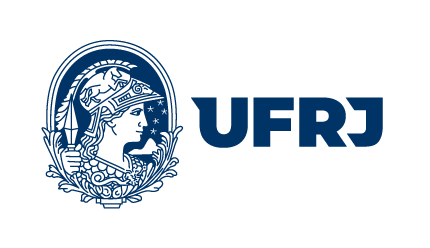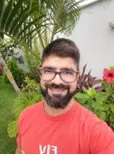
Coordenador: Prof. Daniel de Augustinis Silva
Coordenador Substituto: Prof. Bruno Andrade Pinto Monteiro
Doutor em Educação em Ciências e Saúde pela Universidade Federal do Rio de Janeiro (NUTES/UFRJ) com estágio doutoral sanduíche na Universidade de Aveiro (Ua/PT). Mestre em Tecnologia Educacional nas Ciências da Saúde (NUTES/ UFRJ). Licenciado em Química (UFRJ) e em Física (UNIS). Técnico em Química. Professor Associado da Universidade Federal do Rio de Janeiro (UFRJ/Macaé). Professor do Programa de Pós-Graduação em Educação em Ciências e Saúde (NUTES/UFRJ). Professor do Mestrado Profissional em Ambiente, Sociedade e Desenvolvimento (PROASD/NUPEM-UFRJ). Pesquisador do Grupo de Pesquisa em Linguagens no Ensino de Ciências (LINEC-UFRJ/Macaé). Pesquisador do Grupo de Estudos em Educação Ambiental desde el Sur (GEASUR/UNIRIO). Pesquisador da Rede Internacional de Estudos Decoloniais na Educação Científica e Tecnológica (RIEDECT). Pesquisas no campo da produção discursiva no âmbito da Educação e Divulgação em Ciências, com ênfase nas temáticas de formação de professores, decolonialidade, direitos humanos, interculturalidade, educação ambiental e climática, espaços escolares, não escolares e virtuais de educação. Curriculo Lattes
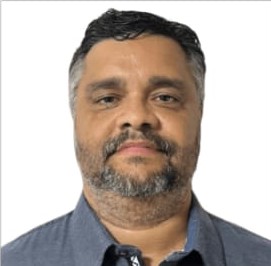
Portarias do Coordenador e Coordenador Substituto
Administrative Coordination Support:
Tatiane Guilherme Lourenço
E-mails:
- secretaria.graduacaoimq@gmail.com
- secretaria.graduacao@imq.macae.ufrj.br
Academic Contact:
coordlicquimica@gmail.com
Tel. (22) 2141-4012
Professional Profile:
It is expected of a licensed in chemistry formed by the UFRJ-Macaé campus, solid knowledge of theories and explanatory models of chemistry, ability to establish the relations of these with the transformation phenomena of the subject considering the characteristics of their future students. It is also expected that it has been awakened to the process of critical and transformative reflection on their classroom practice, which has adequate autonomy to achieve the objectives of the teaching defined by the competencies (state, municipality and school) and also, of permanent updating on the scientific advances of chemistry and progress in education in chemistry, able to act as educators and subjects of the reality of Brazilian basic education.
The student is invited from the first period to have an involvement in the "academic-scientific-cultural activities" (ACC) and the "chemical discipline in school", distributed by the ten periods of the course. With the discipline "chemical at school", licensing comes in contact with the School of Basic Education since the first period of the course, activity that is oriented in a manner integrated by teachers of the Institute of Chemistry and the Faculty of Education. In the last periods, through the disciplines "instrumentation for the chemistry of daily life", "laboratory for the production and evaluation of teaching materials for chemical teaching", "monitoring" and "teaching practice" and the final project of Course, activities developed interdisciplinarily, it is sought for the student to acquire the ability to build a converging and unified knowledge among the areas of knowledge of chemistry and other areas.
The curricular matrix of the course is organized in topics related to the research of chemistry teaching, participation in seminars, external visits to schools and museums, preparation of material and didactic experiments, among others. The pedagogical nucleus offers activities oriented in the form of performance with teachers and high school students, either in the regency of classes, or in the form of other participation activities. In addition, there is a comprehensive formation in all the basic areas of chemistry, mathematics and physics, according to curricular guidelines for the chemistry degree course: "Licensing in chemistry should have general, but solid and comprehensive training in contents of Several fields of chemistry, preparation appropriate to the pedagogical application of knowledge and experiences in chemistry and related areas in the professional performance of knowledge as an educator in fundamental and middle education. "
Curricular matrix:
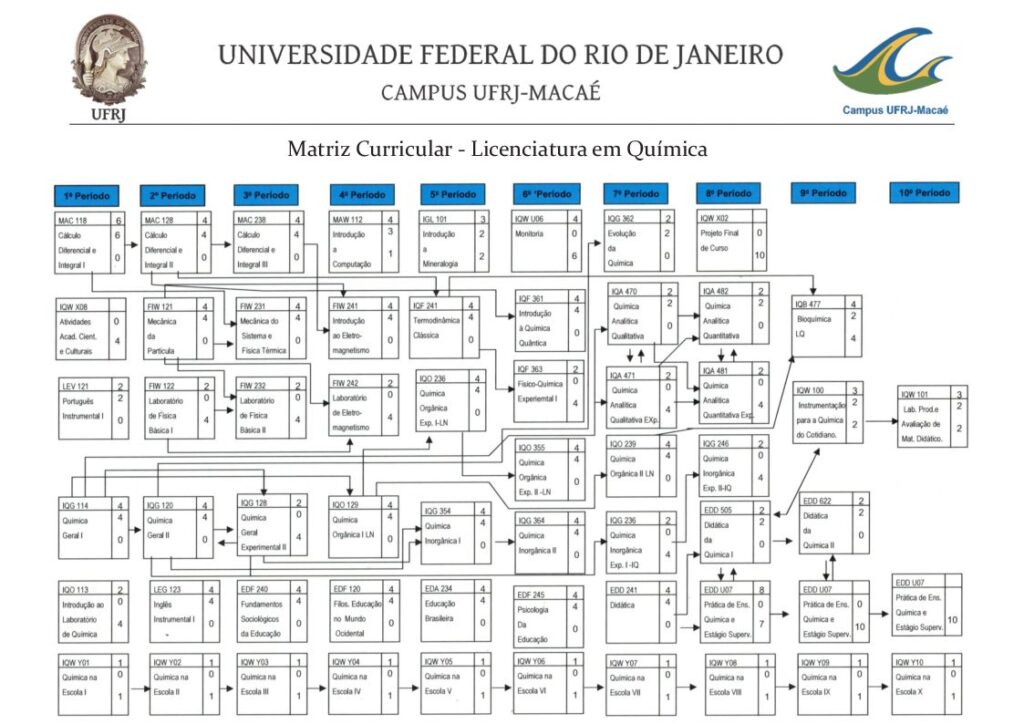
Curricular grid:
Multidisciplinary Institute of Chemistry
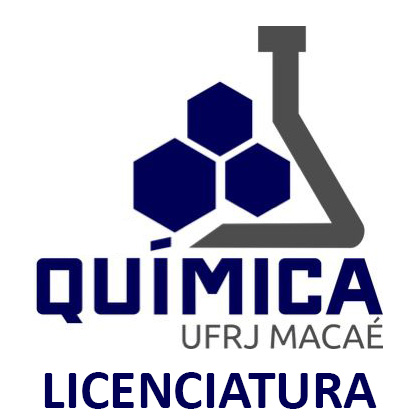
The Federal University of Rio de Janeiro is a public institution that is committed to teaching, research and quality extension, directing their actions to ensure quality educational care, one of the essential conditions for the construction of a Brazilian society that seeks Ensure equal opportunity for all citizens.
The chemistry course, offered at nighttime, was deployed at the UFRJ-Macaé campus in 2008. His conception adopted a convergent curricular matrix, similar to the course of origin at the Campus Rio de Janeiro, where they are presented, from the initial periods, Pedagogical training disciplines alongside those specific contents, as well as instrumental foreign language disciplines and the country vernacular.
- Course duration: 10 periods / 5 years
- Operating Shift: Night
- Annual offer of vacancies: 25 vacancies (single entry in the 1st semester)
- Modality: face-to-face
- Student selection criteria: Vacancies offered by ENEM (Unified MEC Selection System)
Previsão de horários
Curricular grid:
Projeto Pedagógico do Curso:
Acesse aqui o PPC do curso. (Documento desatualizado. Em processo de reformulação).
Collegiate:
Coordenação Estágio Não Obrigatório Licenciatura em Química:
Structuring Teacher Nucleus - NDE:
Documentos
Os programas compilados abaixo são os programas seguidos pela versão curricular de 2017 do Curso de Licenciatura em Química.
